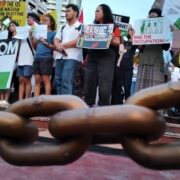Filipinos detained in UAE over TikTok video in good condition, says consul-general
Mifrante International calls on PH government to review pre-departure orientation for OFWs
by Angel Tesorero / Khaleej Times
DUBAI, United Arab Emirates — The five Filipino expatriates who were detained by Sharjah Police after reportedly posting an allegedly indecent video on TikTok are in good condition, Philippine Consul-General Renato Dueñas Jr to the United Arab Emirates (UAE) said.
Dueñas said: “The Philippine Consulate’s ATN (Assistance to Nationals) representative and its legal counsel visited the five detained Filipinos in Sharjah on Wednesday to ascertain their condition. They were given legal advice in preparation for their upcoming hearing.”
“The consulate, through DFA-OUMWA’s (Department of Foreign Affairs – Office of the Undersecretary for Migrant Workers’ Affairs) ATN Fund, will provide them with welfare assistance for their basic needs while in detention,” he added.
The five Filipinos were arrested after reportedly uploading an “indecent video” on TikTok back in March. They thought it was “just for fun” and had no idea it could get them into legal trouble. “They were mistaken for prostitutes,” said a sibling of one of those arrested.
The Philippine Consulate has reiterated its call for Filipinos in the UAE “to respect the customs of the host government and be mindful of content that they post on social media.”
Under Article 17 of the UAE Cybercrime Law, online posting of pornographic materials, gambling, or any activity that may afflict public morals is punishable by imprisonment and a fine of up to Dh500,000. The offender may also face deportation after the service of sentence.
Proper deployment orientation
A legal expert and migrant workers advocacy group Migrante-Middle East are calling for the Philippine government to review and update their Pre-Departure Orientation Seminar (PDOS) given to Filipinos who seek employment abroad.
Barney Almazar, who is a member of the Philippine Bar and holder of a UAE legal consultancy license said the “incident involving five Filipinos could have been easily avoided had they familiarized themselves with the UAE laws.
“The violators have no intent to break the law, their only mistake was to assume that the ways they were accustomed to way back home have no criminal implications in the UAE,” he said.
Almazar explained: “PDOS is a mandatory one-day seminar for Filipinos who are going to work abroad. Seminars are region or country specific to address the peculiarity of certain job sites. Those being deployed to UAE undergo the Middle East module which, unfortunately lacks discussion on the practical day-to-day application of Sharia law.”
“PDOS implementation needs to be re-examined. Since its implementation in 1993, it has not evolved with the needs of the time. When participants enter the seminar room, their only focus was to finish the requirement and get their certification to be able to exit the country. The modules are outdated,” he added.
Know the law
Almazar underscored: “We have to properly equip our migrant workers with practical and useful legal knowledge in the UAE. Under Article 29 of the UAE Civil Code, ignorance of the law excuses no one from compliance therewith. It is the responsibility of each expatriate to know the rules and local customs in the host country, especially that their continued stay in the UAE is not a right but a privilege which can be revoked should they violate the law.”
Migrante-Middle East added labor-sending countries like the Philippines “must educate their workers on the laws of the host country, including Cybercrime law, especially that expatriates are heavy users of social media.”
The group also called for additional funds and more protection for OFWs (overseas Filipino workers).
= = = =
This April 13, 2023 report is original to Khaleej Times, hereby republished with permission from the reporter.







